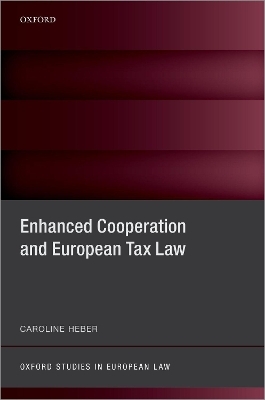
Enhanced Cooperation and European Tax Law
Oxford University Press (Verlag)
978-0-19-289827-2 (ISBN)
The enhanced cooperation mechanism allows at least nine Member States to introduce secondary EU law which is only binding among these Member States. From an internal market perspective, enhanced cooperation laws are unique as they lie somewhere between unilateral Member State laws and uniform European Union law. The law creates harmonisation and coordination between the participating Member States, but may introduce trade obstacles in relation to non-participating Member States. This book reveals that the enhanced cooperation mechanism allows Member States to protect their harmonised values and coordination endeavours against market efficiency. Values which may not be able to justify single Member State's trade obstacles may outweigh pure internal market needs if an entire group of Member States finds these value worthy of protection. However, protection of the harmonised values can never go as far as shielding participating Member States from the negative effects of enhanced cooperation laws. The hybrid nature of enhanced cooperation laws - their nexus between the law of a single Member State and secondary EU law - also demands that these laws comply with state aid law. This book shows how the European state aid law provisions should be applied to enhanced cooperation laws. Furthermore, the book also develops a sophisticated approach to the limits non-participating Member States face in ensuring that their actions do not impede the implementation of enhanced cooperation between the participating Member States.
Caroline Heber is a Senior Research Fellow at the Max Planck Institute for Tax Law and Public Finance, Munich. Prior to this, she pursued her post-doctoral research at the Institute for Austrian and International Tax Law, Vienna University of Economics and Business and worked as a Research Fellow at the Ross Parsons Centre, University of Sydney and at the Department of Fiscal Law, University of Graz. Her area of expertise lies in the field of tax law, European Union law and European integration theory.
Chapter I Introduction
Chapter II Various Forms of Differentiation and Majority Voting as an Alternative
Chapter III Experience with Enhanced Cooperation DS Success and Failure
Chapter IV The Law-Making Procedure
Chapter V Enhanced Cooperation and its Impact on the European Internal Market DS Art. 326 of the TFEU
Chapter VI The Rights and Obligations of Non-Participating Member States: The Principle of Tolerance as a Fundament of Enhanced Cooperation
Chapter VII Conclusions and Outlook
| Erscheinungsdatum | 19.08.2021 |
|---|---|
| Reihe/Serie | Oxford Studies in European Law |
| Verlagsort | Oxford |
| Sprache | englisch |
| Maße | 166 x 243 mm |
| Gewicht | 964 g |
| Themenwelt | Recht / Steuern ► EU / Internationales Recht |
| Recht / Steuern ► Steuern / Steuerrecht | |
| Sozialwissenschaften ► Politik / Verwaltung ► Europäische / Internationale Politik | |
| ISBN-10 | 0-19-289827-2 / 0192898272 |
| ISBN-13 | 978-0-19-289827-2 / 9780192898272 |
| Zustand | Neuware |
| Informationen gemäß Produktsicherheitsverordnung (GPSR) | |
| Haben Sie eine Frage zum Produkt? |
aus dem Bereich


